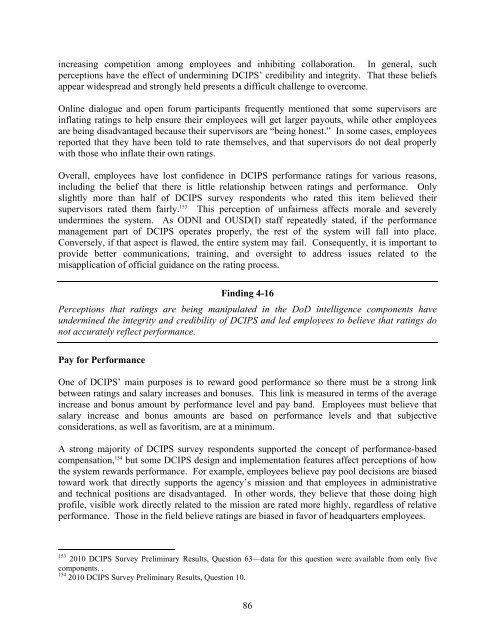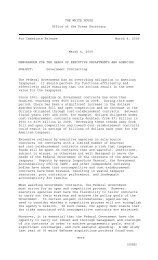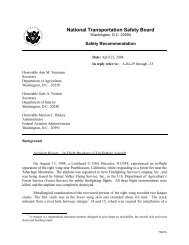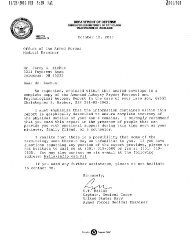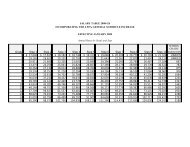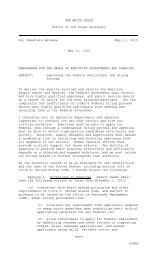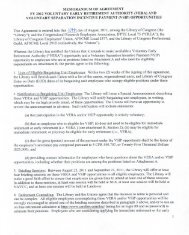Report - Government Executive
Report - Government Executive
Report - Government Executive
You also want an ePaper? Increase the reach of your titles
YUMPU automatically turns print PDFs into web optimized ePapers that Google loves.
increasing competition among employees and inhibiting collaboration. In general, such<br />
perceptions have the effect of undermining DCIPS’ credibility and integrity. That these beliefs<br />
appear widespread and strongly held presents a difficult challenge to overcome.<br />
Online dialogue and open forum participants frequently mentioned that some supervisors are<br />
inflating ratings to help ensure their employees will get larger payouts, while other employees<br />
are being disadvantaged because their supervisors are “being honest.” In some cases, employees<br />
reported that they have been told to rate themselves, and that supervisors do not deal properly<br />
with those who inflate their own ratings.<br />
Overall, employees have lost confidence in DCIPS performance ratings for various reasons,<br />
including the belief that there is little relationship between ratings and performance. Only<br />
slightly more than half of DCIPS survey respondents who rated this item believed their<br />
supervisors rated them fairly. 153 This perception of unfairness affects morale and severely<br />
undermines the system. As ODNI and OUSD(I) staff repeatedly stated, if the performance<br />
management part of DCIPS operates properly, the rest of the system will fall into place.<br />
Conversely, if that aspect is flawed, the entire system may fail. Consequently, it is important to<br />
provide better communications, training, and oversight to address issues related to the<br />
misapplication of official guidance on the rating process.<br />
Finding 4-16<br />
Perceptions that ratings are being manipulated in the DoD intelligence components have<br />
undermined the integrity and credibility of DCIPS and led employees to believe that ratings do<br />
not accurately reflect performance.<br />
Pay for Performance<br />
One of DCIPS’ main purposes is to reward good performance so there must be a strong link<br />
between ratings and salary increases and bonuses. This link is measured in terms of the average<br />
increase and bonus amount by performance level and pay band. Employees must believe that<br />
salary increase and bonus amounts are based on performance levels and that subjective<br />
considerations, as well as favoritism, are at a minimum.<br />
A strong majority of DCIPS survey respondents supported the concept of performance-based<br />
compensation, 154 but some DCIPS design and implementation features affect perceptions of how<br />
the system rewards performance. For example, employees believe pay pool decisions are biased<br />
toward work that directly supports the agency’s mission and that employees in administrative<br />
and technical positions are disadvantaged. In other words, they believe that those doing high<br />
profile, visible work directly related to the mission are rated more highly, regardless of relative<br />
performance. Those in the field believe ratings are biased in favor of headquarters employees.<br />
153 2010 DCIPS Survey Preliminary Results, Question 63—data for this question were available from only five<br />
components. .<br />
154 2010 DCIPS Survey Preliminary Results, Question 10.<br />
86


